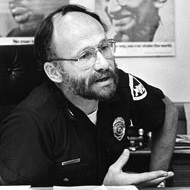
Stories are powerful. They can change an organization’s culture for the better. Since we first learned to walk on two legs we have been telling stories, sharing our experiences, and the experiences of others. Whether it is around a campfire or in a briefing room — stories matter!
One of my colleagues during the Madison transformation was Mike Masterson. He retired from Madison as a captain and went on to lead the Boise Police Department for a decade. He hasn’t forgotten the lessons he learned or the stories he heard.
The following is a piece from my book, Arrested Development, followed by an excerpt from Mike’s recent article in the “FBI Bulletin.”
“When I began to teach other police leaders around the country what we were doing in Madison, the stories I told seemed to be the most effective way I had to get my points across. Those who attended my classes wanted to hear the stories. In effect, the storytelling that goes on within a police academy or department are usually the real things that an organization values. That’s why they are so essential; through story, police officers begin to understand the nature of policing, how they are supposed to act, and what seems to be important.
“Unfortunately, in most police organizations there are more stories about the successes of traditional practices than community policing. In fact, the culture of traditional policing is full of stories that range from high-speed pursuits to drug busts and shoot-outs. Stories are effective; they capture a listener’s attention and, regarding traditional policing, invariably involve the physical, not the service-oriented, side of policing…
“I found, however, that a department transforming to a more community and problem-oriented culture can find just as many interesting and captivating war stories as those told about traditional policing . . .”
By Mike Masterson, Chief of Police (Ret), Boise, ID and Captain (Ret), Madison, WI
“Law enforcement professionals recognize the value of speeches at graduation ceremonies and retirement events. Notable orations often contain stories that help listeners connect with the important words spoken. Leaders play an important role in emphasizing officer values and shaping agency culture through such storytelling . . .
“Anecdotes teach people. They provide an excellent way to understand others, and they assist in shaping culture within agencies. Stories help individuals discover the implicit meaning of the words and enable persons to learn, discover, and own what they need to do for themselves.
“Storytelling is a valuable tool for leaders seeking new behaviors within their departments and teams. Sharing emotive stories of best practices inspires individuals and groups, helps them learn more quickly, and aids organizations with becoming more agile.
“Many veteran officers remember hearing and sharing ‘war stories’ throughout their careers. They heard them about their predecessors, and young officers still get these accounts because they have become part of the culture. Today’s leaders recollect their past and the power of those stories . . .
“Tremendous power exists in stories, and it appears critical for leaders to become their agency’s chief storyteller. For more effective communication, officers should incorporate anecdotes into their messages and reinforce the behaviors their organizations train on and value. Storytelling offers a powerful means to educate, motivate, engage, influence, and connect with subordinates . . .
“In effect, the storytelling that goes on within a police academy or department usually seems to be what individuals value. That shows why stories are so essential. Through anecdotes, officers begin to understand the nature of policing, how they are supposed to act, and what appears important . . .
“Storytelling always has been central to the human experience. It continues to be how we explain and make sense of the world. Now more than ever, law enforcement leaders use blogs and stories to help people understand policing values, strategies, and operations.”
Mr. Masterson may be contacted at ou76mike@gmail.com. Read Masterson’s full article here.
This post was originally published March 14, 2018 at Improving Police.